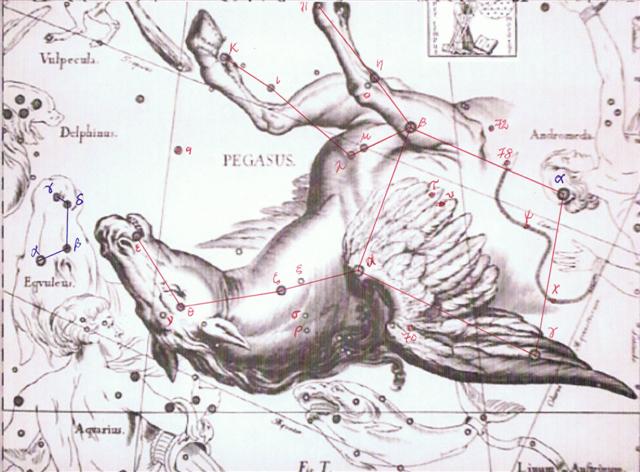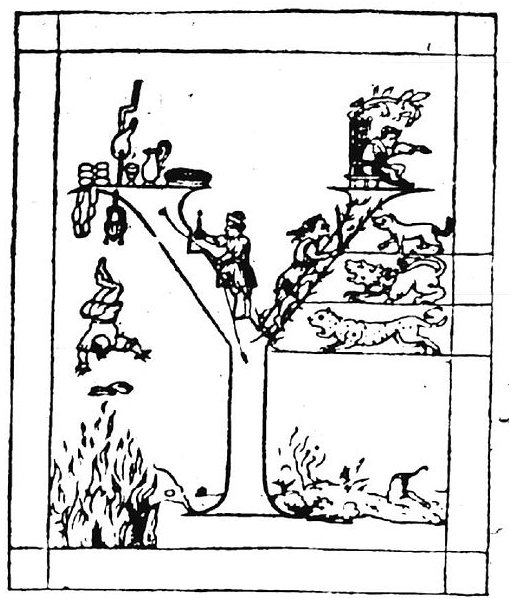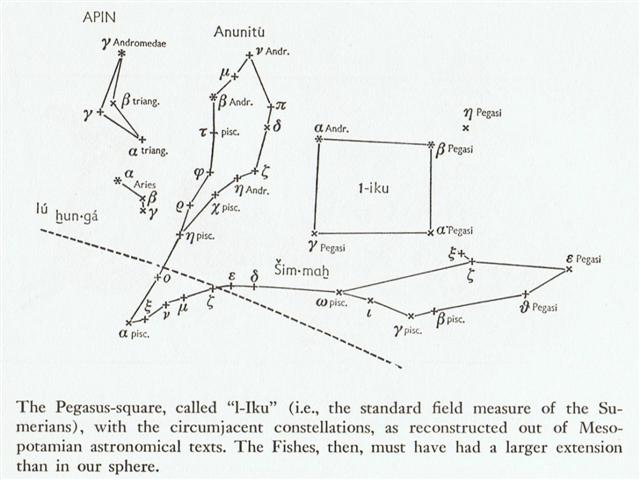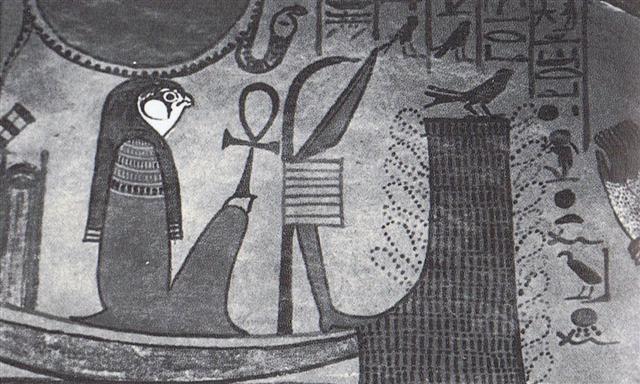Once again. The position of nakshatra Sirius in 30 DECEMBER (i.e. at the end of the previous creation in May 28, 3149 B.C. when Seven Macaw lost his beautiful shining tooth) was inside the Square of Pegasus:
The 4 corner stars of the Square of Pegasus determined the Field - the Seat of Ea: ... Saturn does give the measures: this is the essential point. How are we to reconcile it with Saturn the First King, the ruler of the Golden Age who is now asleep at the outer confines of the world? The conflict is only apparent, as will be seen. For now it is essential to recognize that, whether one has to do with the Mesopotamian Saturn, Enki / Ea, or with Ptah of Egypt, he is the 'Lord of Measures' - spell it me in Sumerian, parshu in Akkadian, maat in Egyptian. And the same goes for His Majesty, the Yellow Emperor of China - yellow, because the element earth [which in China was yellow and not black] belongs to Saturn - 'Huang-ti established everywhere the order for the sun, the moon and the stars' ... And this was obviously a place where water was upon the earth in contrast to the Abyss where water was below the surface of the earth:
With fresh water on Mother Earth she quickly would revive. All her living spirits would return with the Swallow (the Pisces fish in the west).
... Now birds and fishes are born under the sign of the Yin, but they belong to the Yang. This is why birds and fishes both lay eggs. Fishes swim in the waters, birds fly among the clouds. But in winter, the swallows and starlings go down into the sea and change into mussels ... The 2nd fish to rise in Pisces was Anunitum (τ) - with a sign of the planet Venus close by:
... Though Andromeda has its roots most firmly in the Greek tradition, a female figure in Andromeda's place appeared in Babylonian astronomy. The stars that make up Pisces and the middle portion of modern Andromeda formed a constellation representing a fertility goddess, sometimes named as Anunitum or the Lady of the Heavens ... We should note that Aries was named Dumuzi (Tammuz, Thamus):
... 'Most ingenious Thoth', said the god and king Thamus, 'one man has the ability to beget arts, but the ability to judge of their usefulness or harmfulness to their users belongs to another; and now you, who are the father of letters, have been led by your affection to ascribe to them a power the opposite of that which they really possess. For this invention will produce forgetfulness in the minds of those who learn to use it, because they will not practise their memory. Their trust in writing, produced by external characters which are no part of themselves, will discourage the use of their own memory within them. You have invented an elixir not of memory, but of reminding; and you offer your pupils the appearance of wisdom, not true wisdom, for they will read many things without instruction and will therefore seem to know many things, when they are for the most part ignorant and hard to get along with, since they are not wise, but only appear wise.' Names were anciently chosen with care because to them were attached well known meanings - they were as forceful to the ear as the images were for the eye: ... The father of Aemilianus the orator, to whom some of you have listened, was Epitherses, who lived in our town and was my teacher in grammar. He said that once upon a time in making a voyage to Italy he embarked on a ship carrying freight and many passangers. It was already evening when, near the Echinades Islands, the wind dropped and the ship drifted near Paxi. Almost everybody was awake, and a good many had not finished theire after-dinner wine. Suddenly, from the island of Paxi was heard the voice of someone loudly calling Thamus, so that all were amazed. Thamus was an Egyptian pilot, not known by name to many on board. Twice he was called and made no reply, but the third time he answered; and the caller, raising his voice, said, 'When you come opposite to Palodes, announce that Great Pan is dead.' On hearing this, all, said Epitherses, were astounded and reasoned among themselves whether it were better to carry out the order or to refuse to meddle and let the matter go. Under the circumstances Thamus made up his mind that if there should be a breeze, he would sail past and keep quiet, but with no wind and a smooth sea about the place he would announce what he had heard. So, when he came opposite Palodes, and there was neither wind nor wave, Thamus from the stern, looking toward the land, said the words as he heard them: 'Great Pan is dead'. Even before he had finished there was a great cry of lamentation, not of one person, but of many, mingled with exclamations of amazement. As many persons were on the vessel, the story was soon spread abroad in Rome, and Thamus was sent for by Tiberius Caesar. Tiberius became so convinced of the truth of the story that he caused an inquiry and investigation to be made about Pan; and the scholars, who were numerous at his court, conjectured that he was the son born of Hermes and Penelope ... Why was there a Hired Man at this place? Probably because it was a cardinal point (cfr the First Point of Aries) and such a place was dangerous for a ruler. Someone else than the king ought to sit on the throne at such times. ... to enter a war canoe from either the stern or the prow was equivalent to a 'change of state' or 'death'. Instead, the warrior had to cross the threshold of the side-strakes as a ritual entry into the body of his ancestor as represented by the canoe ... A hired man could serve as the sacrifice: ... 'In Upper Egypt', wrote Sir James G. Frazer in The Golden Bough, citing the observations of a German nineteenth-century voyager, 'on the first day of the solar year by Coptic reckoning, that is, on the tenth of September, when the Nile has generally reached its highest point, the regular government is suspended for three days and every town chooses its own ruler. This temporary lord wears a sort of tall fool's cap and a long flaxen beard, and is enveloped in a strange mantle. With a wand of office in his hand and attended by men disguised as scribes, executioners, and so forth, he proceeds to the Governor's house. The latter allows himself to be deposed; and the mock king, mounting the throne, holds a tribunal, to the decisions of which even the governor and his officials must bow. After three days the mock king is committed to the flames, and from its ashes the Fellah creeps forth ... Spring equinox was comparable to a mouth which was opening and craving for food.
|
|||||||||||||||||||||||||||||||||||||||||||||||||||||||||||||||||||||||||||||||||||||||||||||||||||||||||||||||||||||||||||








